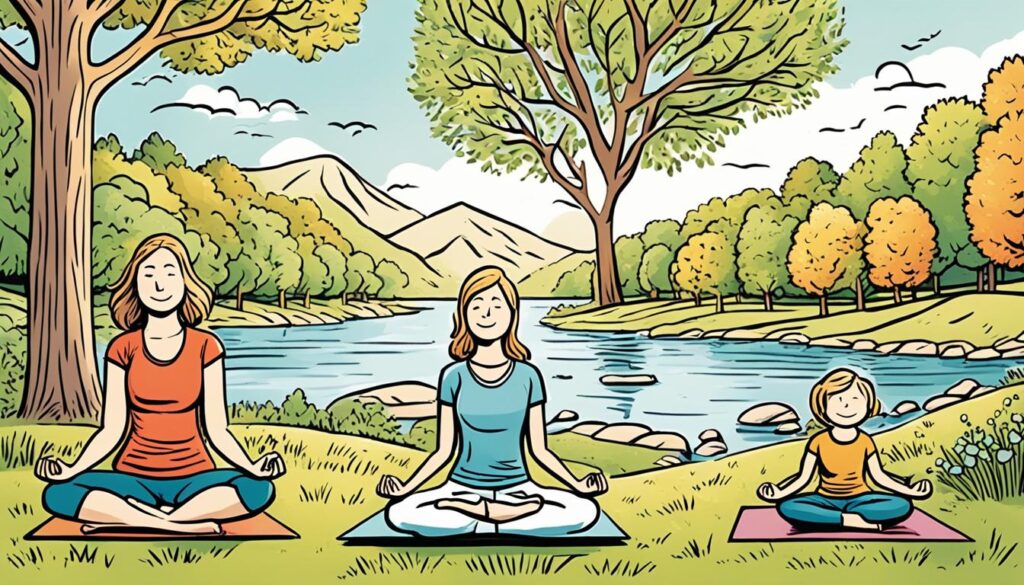Life can feel like a whirlwind, making us feel overwhelmed and stressed. We often lose sight of our well-being and happiness in our busy lives.
Imagine waking up feeling refreshed and ready for the day. Imagine having tools to handle stress with grace. Imagine feeling deeply connected to yourself and your purpose.
This is what self-care and mindfulness can do for you. They help you live a balanced, fulfilling life. It starts with choosing to care for yourself every day.
Key Takeaways:
- Self-care and mindfulness lower stress and help you cope better during illness.
- Good self-care habits reduce illness risk and boost energy, improving well-being.
- Mindfulness helps manage stress and helps you know what you need, stopping unhealthy habits.
- Being connected with others is key to self-care, cutting down on anxiety and depression.
- Self-care and mindfulness lead to a life of balance, fulfillment, and joy.
What Is Self-Care?
Self-care is more than just a trendy term. It’s a key way to keep our bodies, minds, and hearts healthy. It means doing things on purpose to take care of ourselves. We do this because we know we deserve it and it helps us stay well.
Self-care is about making a promise to ourselves. It means listening to what our bodies, minds, and hearts need. We take steps to support ourselves in our relationships, work, and daily life.
Everyone’s self-care looks different. It’s a personal thing that changes for each person. It might include things like mindfulness, hobbies, time with family, exercise, therapy, or just taking time for ourselves.
Self-care isn’t just about treating ourselves. It’s a way to take care of our whole being. By making self-care a part of our lives, we avoid burnout, reduce stress, and keep a good balance between our duties and our personal needs.
Self-care is very important. It’s not selfish; it’s essential for being our best in every part of life. By caring for ourselves, we can better care for others and make a positive impact in our communities.
Next, we will look into why self-care is crucial and the many ways it improves our lives.
Why Self-Care Is Important
Self-care is key to our overall health, touching both our body and mind. It helps us deal with stress, boosts focus, and makes us happier. It even lowers the risk of serious illnesses like heart disease and cancer.
Self-care helps fight anxiety and depression. It makes our mental health better and builds emotional strength. It’s vital for those in helping jobs, who often face a lot of stress and emotional strain.
Self-care covers eight areas: emotional, environmental, financial, intellectual, occupational, physical, social, and spiritual well-being. This balanced approach helps us stay well-rounded. By focusing on self-care, we see better health, more productivity, and stronger relationships.
| Benefits of Self-Care: |
|---|
| Reduces anxiety and depression |
| Minimizes frustration and anger |
| Increases happiness |
| Improves energy levels |
| Reduces the risk of heart disease, stroke, and cancer |
Self-care activities like exercise boost our physical health. Exercise makes us stronger, more flexible, and keeps our heart healthy. This makes everyday tasks easier and lowers the chance of getting disabled.
Adding self-care to our daily life is a way to look after ourselves. Even a few minutes each morning can make a big difference. It helps us recharge and feel better.
Having a self-care plan helps us keep up with our well-being. We think about our stress and what we can do to help. This plan fits our unique needs and life situations.
Talking about our self-care plan with friends makes us more accountable. It lets us support and motivate each other. We get to share tips and stay on track together.
A self-care plan changes as our lives do. It reminds us of what we need to do to stay well. By being kind to ourselves and sticking to the plan, we can handle life’s ups and downs better.
How to Practice Self-Care
Self-care is key to keeping us healthy and happy, especially in our busy, stressful lives. It helps us focus on our physical, mental, and spiritual health. By making self-care a part of our daily life, we can handle challenges better and live a better life.
Here are some self-care tips to help you feel good:
- Get enough sleep: Good sleep refreshes our body and mind. Try to get 7-9 hours of sleep each night for your health.
- Eat nutritious meals: Eating well gives you the energy and nutrients you need to stay healthy.
- Exercise regularly: Being active is good for your body and mind. It makes you feel happier and less stressed.
- Practice mindfulness or meditation: Mindfulness, like the S.T.O.P technique by Jon Kabat-Zinn, helps you stay in the moment. It lowers stress and improves your focus and choices.
- Engage in hobbies or activities you enjoy: Doing things you love helps you relax and find balance in life.
- Set boundaries: Saying no and setting limits is important for your well-being. It helps you maintain a good work-life balance and know your limits.
- Seek support when needed: It’s okay to ask for help from friends, family, or professionals. Remember, asking for help shows strength.
Regular self-care and finding what works for you can make you more resilient and improve your well-being. Remember, self-care isn’t selfish. It’s essential for being your best self for yourself and others.
Contact our experts for personalized self-care advice:
Call us at 877-697-9355 for expert advice on adding self-care to your daily routine.
The Relationship Between Self-Care and Mindfulness
Self-care and mindfulness work together to improve our well-being. Mindfulness, like meditation, helps us stay in the moment. Studies show it lowers stress, brings calm, and makes us happier.
Emily found that a daily 20-minute meditation helped her feel more energized. Adding mindfulness to her day helped her stay calm during tough times. This brought her peace and strength.
A 5-week seminar taught healthcare students about self-care. It covered the mind, body, and spirit. Students felt less anxious, more kind to themselves, and happier.
Yoga, a mix of physical and mental wellness, helps nurses and healthcare workers. It cuts down on stress and prevents burnout. Yoga and mindfulness together are proven to reduce stress.
Everyone’s self-care looks different, covering physical, emotional, mental, spiritual, and social health. Mindfulness helps by making us more aware of ourselves. It teaches us to relax and handle stress better.
The COVID-19 pandemic made self-care and mindfulness more important. Many Americans found it hard to keep up with their health. 64% focused more on their mental health. Self-care, including mindfulness, helps manage stress and improve well-being.
Mindfulness, Yoga, and Stress Reduction
| Mindfulness and Yoga Interventions | Stress Reduction |
|---|---|
| Graduate healthcare students | Improved anxiety, self-compassion, mindfulness, depression, and stress |
| Nurses and healthcare professionals | Promising results in reducing stress |
| Employees in intervention studies | Positive impact on stress and psychological health |
| Undergraduate nursing students | Effectiveness in reducing stress and anxiety |
Daily Practices for Self-Care and Mindfulness
Adding self-care and mindfulness to our daily life is key for better well-being. By making self-care a priority, we boost our mental strength, physical health, and emotional balance. Here are some easy ways to add self-care to your day:
- Set aside time for self-reflection or journaling: Just a few minutes each day to think about our thoughts and feelings can clear our minds. It helps us understand ourselves better and be kind to ourselves.
- Engage in a mindfulness or meditation practice: Mindfulness can lower stress and improve focus. Spending a few minutes daily on mindful breathing or meditation brings peace and balance.
- Practice gratitude: Being thankful for the good things in our lives shifts our focus to now. It makes us happier and boosts our well-being. You can write in a gratitude journal or thank someone each day.
- Take breaks: Taking short breaks helps avoid burnout and refreshes us. Even a quick walk or some deep breaths can make a big difference.
- Engage in physical activity: Exercise is great for our body and mind. It can be a run, yoga, or a sport. Physical activity lowers stress and lifts our mood.
- Make time for activities that bring joy and relaxation: Reading, listening to music, or doing a hobby are important for self-care. They refresh our minds and help us recharge.

Everyone’s self-care routine is different. It’s important to pick what works for you and fits your life. Adding these self-care and mindfulness activities to your day can improve your overall well-being. It helps you find balance and peace.
Creating a Self-Care Plan
Creating a self-care plan can greatly improve our well-being. It helps us focus on activities that are good for us. This leads to better physical, mental, and emotional health.
Understanding the benefits of a self-care plan is key. It helps with:
- Enhancing physical health
- Reducing stress and anxiety
- Improving mental health
- Boosting self-esteem and self-compassion
- Encouraging a healthier work-life balance
- Promoting emotional resilience
- Strengthening relationships
Now, let’s look at key statistics on creating a self-care routine:
Start small to form new habits
Include activities you enjoy for better adherence
Set reminders for accountability
Flexibility is essential in maintaining the routine
Building slowly over time prevents overwhelm
Reflecting on progress is motivational
Seeking support enhances adherence
With these tips, here are steps to create a self-care plan:
- Assess your current situation for self-care needs
- Identify specific needs for improvement in different areas of your life
- Brainstorm activities that align with those needs
- Set clear, achievable goals with specificity
- Schedule self-care activities intentionally
- Monitor progress and adjust as needed
- Seek support from peers or professionals when required
Remember the six key pillars of self-care:
| Physical care | Emotional care | Social care |
|---|---|---|
| Regular exercise, healthy eating, proper sleep, and medical check-ups | Journaling, therapy, self-compassion, and stress management | Nurturing relationships, setting boundaries, and engaging with supportive communities |
| Spiritual care | Intellectual care | Professional care |
| Meditation, prayer, nature connection, and purposeful activities | Reading, learning, creativity, and cognitive engagement | Job satisfaction, work-life balance, and professional growth opportunities |
A good self-care plan balances these pillars. It focuses on areas that need growth and care.
Self-care plans vary, but 52% focus on physical health. 24% on emotional well-being. 10% on creating a calm space. 14% on social well-being, and 10% on intellectual and creative activities. This shows self-care plans can be tailored to what we need and like.
Physical self-care
- Regular exercise before or after work: Good for physical health
- Sticking to a sleep routine: Keeps energy up
Psychological self-care
- Keeping a journal: Helps with mental clarity
- Doing hobbies outside of work: Keeps your mind engaged and relaxed
Emotional self-care
- Writing down three positive things daily: Helps you focus on good feelings
- Keeping close to friends: Good for emotional health
Spiritual self-care
- Meditation or reflection: Keeps you grounded
- Walking or yoga: Boosts spiritual health
Relationship self-care
- Valuing relationships with family and friends: Important for support
- Going to family and friends’ events: Helps with well-being and balance
Adding these activities to your self-care plan helps you live a balanced and healthy life.
Evolving Beyond Fight-or-Flight through Self-Care
The fight-or-flight response is a natural way our body reacts to stress. It makes us ready to face or run from danger. But staying in this state can harm our health. That’s why self-care is important for managing stress.
Self-care means taking steps to look after our physical, mental, and emotional health. It’s more than just relaxing; it’s about meeting our own needs. By doing self-care, we move past fight-or-flight and learn to respond with empathy and action.
Research shows that self-care changes our brain. It changes the way our brain reacts to challenges, helping us stay calm and clear-headed. By focusing on self-care, we become more resilient and can make positive changes in our lives.
In today’s busy world, it’s key to step away from news and social media sometimes. Being constantly connected can make us feel overwhelmed and keep us in fight-or-flight mode. Taking a break from technology lets us reflect and recharge.
The Importance of Preparedness for Self-Care
Having a self-care plan is helpful for making it a part of our daily life. This plan can include things like exercise, meditation, spending time with family, hobbies, and being thankful. Having options means we can pick what feels right for us in the moment.
Self-care is not a selfish act—it is an act of self-preservation and resistance against the burnout culture that pervades our society.
Remember, you don’t need permission or feel bad about taking care of yourself. You have the power to put your well-being first and tell others you need self-care. By showing how important self-care is, you can encourage others to do the same.
It’s important to know what you need for self-care, even if it affects others. It’s not selfish; it’s vital for your health. Taking care of yourself helps you be a better friend, family member, and community member.

Self-care helps us move past fight-or-flight and find healthier ways to deal with stress. By focusing on self-care and being mindful, we can escape the cycle of constant stress. Self-care lets us live well and make a positive difference in the world.
The Importance of Taking Breaks and Resting
Taking breaks and resting are key to self-care. It’s vital to know when we need a moment to ourselves and be brave enough to take it. By stopping, breathing, and thinking things over, we can refill our energy and get our strength back. It’s important to notice when we need rest and take steps to recharge ourselves for our well-being.
Studies show that breaks of 5 to 60 minutes can boost our energy, productivity, and focus while studying. But, social media isn’t a good break, research says. Better options include meditation, walking, laughing, organizing your space, and dancing to help focus and energize your mind and body.
One great break idea is a 15 to 20-minute power nap. Power naps can refresh your brain and make you more productive. Also, progressive muscle relaxation can relax you and fight stress during breaks.
Short breaks of just 5 minutes can also help. Doing deep breathing, meditation, visualization, or changing your surroundings can reduce stress and bring calm and clarity.
Breaks aren’t just for studying or work. They help reduce stress, keep you performing well, and cut down on the need for long recovery later. Taking breaks during the day can increase your energy at work and lessen exhaustion.
Breaks are key to recovering from stress, doing better, and feeling good overall. They help us recharge, lower the risk of getting tired, sleep problems, and heart diseases, and bring balance to our lives.
Insight Timer, a free app for sleep, anxiety, and stress, can be a great tool for relaxing and meditating during breaks.
Many people feel judged for taking a break at work. But, research shows that over 9 in 10 workers feel refreshed after taking breaks. Also, 94% of workers are more likely to stay at a job if their bosses support taking breaks.
| % of Workers | |
|---|---|
| Feel judged when taking a break from work in the middle of the day | 22% |
| Only occasionally, rarely, or never take a break | 39% |
| Employees who feel refreshed after taking breaks | 94% |
| Employees more likely to stay at a job if breaks are encouraged | Over 9 in 10 |
Taking breaks and resting are crucial for self-care and greatly improve our well-being. By adding purposeful breaks to our study and work, we can recharge, boost productivity, and focus better. So, when you feel like taking a break, remember to take care of yourself and rest and recharge.
Conclusion
Self-care and mindfulness are key to a balanced life. They help us manage stress, find peace, and overcome challenges. They also help us control our feelings, make better choices, and build strong relationships.
Studies show that yoga and mindfulness can boost our health and productivity. They help reduce stress for people like doctors and leaders. This shows how important these practices are.
Self-care isn’t selfish; it’s essential for taking care of ourselves. It lets us be fully present for others. By focusing on self-care and mindfulness, we improve our mental health, boost our confidence, and find a better balance between work and life. Let’s make self-care and mindfulness a daily habit for a happier future.










